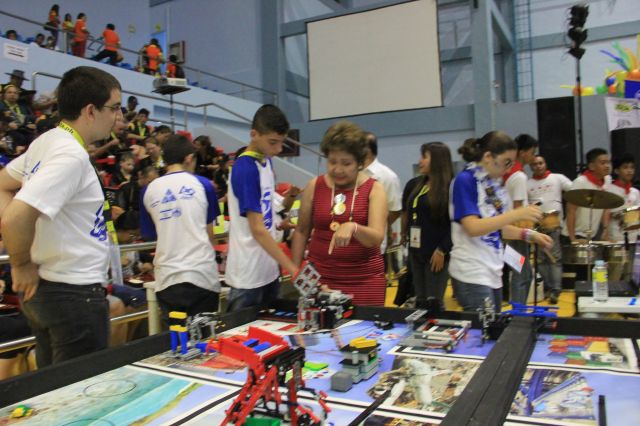
Mayor Paz Radaza asks the group from Israel how to operate their robot. (CDN PHOTO/NORMAN V. MENDOZA)
Twelve countries from around the world are participating in the First Lego League (FLL) Philippine Islands Invitational Robotics held in Lapu-Lapu City.
The 500 or so participants from Australia, India, Indonesia, Italy, Israel, Japan, Philippines, South Korea, Spain, Brazil, Pakistan, China and Singapore were welcomed at the start of the competition at the Hoops Dome last Wednesday.
At the Plantation Bay Resort and Spa in Marigondon, the participants were entertained by their Filipino hosts with cultural dances, while they had dinner given by the Lapu-Lapu city government.
Trash Trek is the theme for FLL Philippine Islands Invitational Robotics Competition from June 1-4.
The FLL, created through a partnership between FIRST (For Inspiration and Recognition of Science and Technology) and the LEGO Group, aims to inspire future scientists and engineers.
Students aged 9-16 design, build and program autonomous mobile robots.
Mylene Abiva, president and CEO of Felta Multimedia Inc. and the national organizer of FLL Philippine Islands Invitational and Philippine Robotics Olympiad (PRO) said, “The Philippines is honored to host an international event for young people to discover fun in science and technology while building self-confidence, knowledge and valuable employment including life skills.”
Students from different schools yesterday witnessed the display of different machines and devices that will help recycle or process food wastes and trash into useful materials.
The event is sponsored by Intel Philippines, Microsoft, Bethel, Island Souvenirs, Department of Education Region 7 and the Lapu-Lapu City government.
Mayor Paz Radaza said Lapu-Lapu City is proud to have the participants from countries all over the world here for the FLL.
“Today, technology and innovation bring revolutionary and disruptive changes to our lives at a pace and on a scale that are unprecedented. For us the digital migrant, it is equally important to continue to innovate to stay relevant,” she said.
“On the economic level, throughout history, new technology created new industries, new trade and new wealth. On the people level, new technology improved lives. From engineering, to medicine, agriculture, entertainment and even communication, technology has greatly improved the way we live,” she added.
She further said that Facebook, Twitter, LinkedIn, Instagram, are some of the technology companies that strive to challenge the limitations of communication by introducing platforms where people can create and share content to the world and in fact, virtual reality (VR) technology, which was once a dream is now on its debut to the mass market.
Radaza announced that the Lapu-Lapu City Robotics Team has garnered numerous awards both in national and international competitions.
Just last year, the city placed 10th out of 32 teams that participated in the GEN II Football, World Robot Olympiad in Doha, Qatar. The success of being the 5-time champion in Robot Olympiad national level and of being representatives of the country to the Robot Olympiad in Korea in 2009, Malaysia in 2012, Indonesia in 2013, Russia in 2014 and Qatar in 2015, brings honor and pride to Lapu-Lapu City and encourages more youth to be innovators and problem-solvers in our community.
DepEd Lapu-Lapu has also launched the ROBO4ED Training of Trainers Program.
Just this summer, they trained 241 teachers to become Robotics trainers in their respective schools. They have also given nine Lego Mindstorm robotics kits to Lapu-Lapu Robotics team coming from their sponsor Compass Education, which is planning to equip all the city’s 69 schools with their own robotics kits that they can use in teaching.
Additionally, they also recently opened their new Robotics Center to house the innovative projects, train students and teachers in upcoming robotics competitions.
“Together, we will continue to strive hard and maintain these three initiatives: Our Lapu-Lapu City Robotics Team, Robotics Center, and Robo4Ed program; to continue to develop partnerships here and abroad so that we can achieve the same vision as Dean Kamen’s,” Radaza said.
Radaza said that according to Kamen, “The robots are a vehicle for students to learn important life skills. They should live with a vision, with confidence, and with a sense that they can create their own future.”